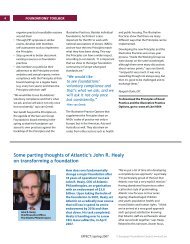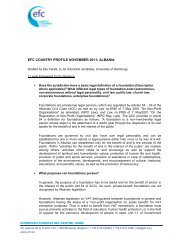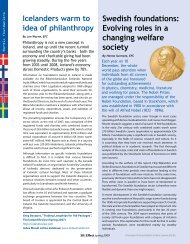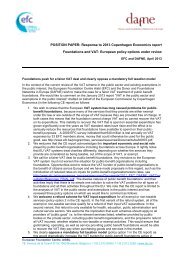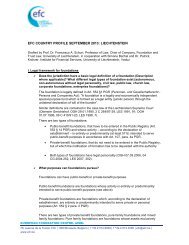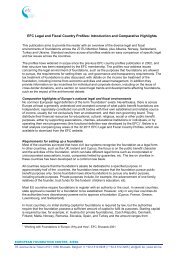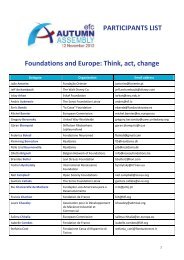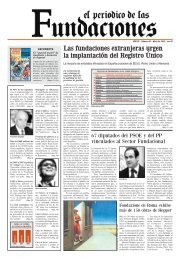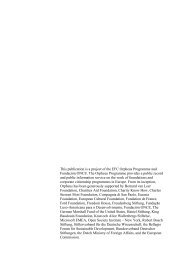European perspectives on global health: a policy glossary
European perspectives on global health: a policy glossary
European perspectives on global health: a policy glossary
Create successful ePaper yourself
Turn your PDF publications into a flip-book with our unique Google optimized e-Paper software.
2. Europe must include <strong>global</strong> <strong>health</strong> in all fields of <strong>policy</strong><br />
Human security and <strong>health</strong><br />
Security is usually defined as the c<strong>on</strong>diti<strong>on</strong> of<br />
being protected from, or not exposed to, some<br />
danger or threat. Human security includes<br />
freedom from want and freedom from fear.<br />
This means the absence of hunger and illness<br />
as well as of violence and war. Human security<br />
places the individual rather than the state at<br />
the centre of security c<strong>on</strong>siderati<strong>on</strong>s.<br />
The proliferati<strong>on</strong> of efforts to c<strong>on</strong>nect public<br />
<strong>health</strong> and security reveals both the emergence<br />
of the political importance of public <strong>health</strong> and<br />
the lack of c<strong>on</strong>sensus about what security should<br />
mean in internati<strong>on</strong>al relati<strong>on</strong>s and foreign <strong>policy</strong>.<br />
Some experts support <strong>on</strong>ly a narrow c<strong>on</strong>necti<strong>on</strong><br />
between security and <strong>health</strong> that flows from the<br />
threat of violence from biological weap<strong>on</strong>s. Other<br />
commentators would also include virulent, fastmoving<br />
communicable disease pandemics, such as<br />
pandemic influenza, as security threats. More broadly,<br />
human security prop<strong>on</strong>ents would expand the range<br />
of <strong>health</strong> threats to individuals that count as security<br />
issues bey<strong>on</strong>d c<strong>on</strong>tagious pandemics. Security-based<br />
arguments and rhetoric have become comm<strong>on</strong>place in<br />
the world politics of public <strong>health</strong>.<br />
In internati<strong>on</strong>al relati<strong>on</strong>s and foreign <strong>policy</strong> thinking,<br />
security has generally meant nati<strong>on</strong>al security, or the<br />
security of the state from military violence used or<br />
threatened by another state. This state-centric violence<br />
paradigm shaped how leaders and governments<br />
c<strong>on</strong>ceived of nati<strong>on</strong>al security. Anything that fell<br />
outside of the threat of military violence from another<br />
state was not, by definiti<strong>on</strong>, a security issue. Thus,<br />
public <strong>health</strong> problems, such as communicable disease<br />
epidemics, were traditi<strong>on</strong>ally outside the realm of<br />
security <strong>policy</strong>. Historically, security and <strong>health</strong> never<br />
developed any type of <strong>policy</strong> relati<strong>on</strong>ship.<br />
The end of the Cold War opened a new debate<br />
about what security means and a more diverse<br />
range of issues began to appear <strong>on</strong> the nati<strong>on</strong>al<br />
security agendas of states, ranging from terrorism<br />
to envir<strong>on</strong>mental degradati<strong>on</strong>. In additi<strong>on</strong>, other<br />
c<strong>on</strong>cepts of security, most notably the idea of<br />
human security promulgated by the United Nati<strong>on</strong>s<br />
Development programme, began to challenge the<br />
traditi<strong>on</strong>al dominance of nati<strong>on</strong>al security. Human<br />
security placed the individual rather than the State at<br />
the centre of security c<strong>on</strong>siderati<strong>on</strong>.<br />
The United Nati<strong>on</strong>s Development Programme’s<br />
( UNDP ) 1994 Human Development Report is<br />
c<strong>on</strong>sidered a milest<strong>on</strong>e publicati<strong>on</strong> in the field of<br />
human security, marking the point where the c<strong>on</strong>cept<br />
gained internati<strong>on</strong>al acceptance. The UNDP report<br />
states that human security c<strong>on</strong>sists of two basic<br />
pillars : the freedom from want and the freedom from<br />
fear. This means the absence of hunger and illness<br />
as well as of violence and war. C<strong>on</strong>sidered further,<br />
possible threats to human security were categorised<br />
into seven main categories : ec<strong>on</strong>omic, food, <strong>health</strong>,<br />
envir<strong>on</strong>mental, pers<strong>on</strong>al, community, and political<br />
security.<br />
During the 1990s and early 2000s, <strong>health</strong> has been<br />
increasingly c<strong>on</strong>nected with different c<strong>on</strong>cepts of<br />
security. Experts have referred to this process as the<br />
“securitisati<strong>on</strong>” of public <strong>health</strong>. The diversity of<br />
ways in which public <strong>health</strong> has been securitised is<br />
impressive. Threats of biological weap<strong>on</strong>s proliferati<strong>on</strong><br />
am<strong>on</strong>g state and n<strong>on</strong>-state actors led many countries,<br />
especially the United States, to see nati<strong>on</strong>al and<br />
internati<strong>on</strong>al public <strong>health</strong> capabilities as critical<br />
nati<strong>on</strong>al security assets should resp<strong>on</strong>ses to biological<br />
violence be required. The UN Security Council<br />
c<strong>on</strong>siders HIV / AIDS a threat to internati<strong>on</strong>al peace<br />
and security. Strategic visi<strong>on</strong>s of reforming the United<br />
Nati<strong>on</strong>s prominently emphasised the importance<br />
of public <strong>health</strong> to the c<strong>on</strong>cept of “comprehensive<br />
collective security.” The World Health Organizati<strong>on</strong><br />
( WHO ) presented its new strategy against the <strong>global</strong><br />
threat of communicable diseases as <strong>on</strong>e that would<br />
strengthen “<strong>global</strong> <strong>health</strong> security.” Finally, the<br />
increasing threats individuals and populati<strong>on</strong>s face<br />
from different disease problems directly c<strong>on</strong>nected<br />
public <strong>health</strong> with the human security c<strong>on</strong>cept.<br />
The securitisati<strong>on</strong> of public <strong>health</strong> has important<br />
implicati<strong>on</strong>s for the individual and collective efforts of<br />
<str<strong>on</strong>g>European</str<strong>on</strong>g> countries <strong>on</strong> both <strong>health</strong> and security <strong>policy</strong>.<br />
The Member States of the <str<strong>on</strong>g>European</str<strong>on</strong>g> Uni<strong>on</strong> have l<strong>on</strong>g<br />
been in pursuit of a comm<strong>on</strong> strategy or approach<br />
to security problems, and the new linkages between<br />
security and <strong>health</strong> raise questi<strong>on</strong>s and perhaps<br />
opportunities for the EU’s desire for a comm<strong>on</strong><br />
22 <str<strong>on</strong>g>European</str<strong>on</strong>g> Foundati<strong>on</strong> Centre – <str<strong>on</strong>g>European</str<strong>on</strong>g> Partnership for Global Health



